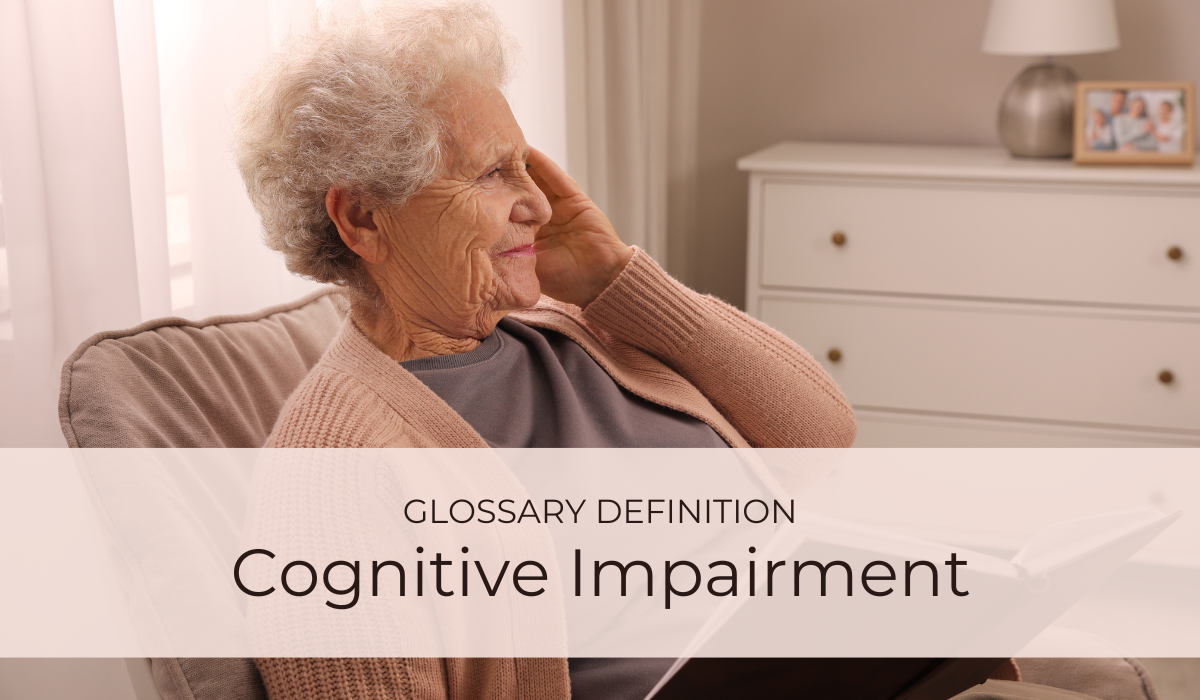Cognitive Impairment | Glossary Definition

What does cognitive impairment mean, and how does it impact the elderly and their caregivers? In this article, we'll explore the definition of cognitive impairment and its significance in the world of caregiving for the elderly.
What is Cognitive Impairment?
Cognitive impairment refers to a decline in a person's cognitive abilities, which are the mental processes that enable us to think, remember, learn, and make decisions. These abilities are essential for daily life, from remembering to take medication to making financial decisions. When cognitive impairment occurs, it can affect a person's quality of life and their ability to perform everyday tasks independently.
Types of Cognitive Impairment
Cognitive impairment comes in various forms and severity levels, and it can result from different underlying causes. Here are some common types:
- Mild Cognitive Impairment (MCI): MCI is a stage between normal age-related cognitive decline and more serious conditions like dementia. People with MCI may experience noticeable memory problems but can still perform daily activities.
- Alzheimer's Disease: Alzheimer's is a progressive neurodegenerative disease that primarily affects memory and thinking skills. It is the most common cause of dementia among older adults.
- Vascular Cognitive Impairment: This type of impairment is linked to problems with blood flow to the brain, often due to conditions like stroke or small vessel disease.
- Lewy Body Dementia: Lewy body dementia affects thinking, memory, and motor functions. It is associated with the presence of abnormal protein deposits in the brain.
- Frontotemporal Dementia: This type of dementia primarily affects personality, behavior, and language skills, and it typically occurs earlier in life than Alzheimer's.
Significance in Elderly Family Caregiving
Cognitive impairment has significant implications for elderly family caregivers. Here's why it's important to understand:
- Increased Care Responsibilities: Caregivers of cognitively impaired elderly family members often take on additional responsibilities, such as managing medications, ensuring safety, and providing emotional support.
- Emotional Strain: Watching a loved one's cognitive abilities decline can be emotionally challenging for caregivers. Feelings of grief, frustration, and helplessness are common.
- Safety Concerns: Cognitive impairment can lead to forgetfulness and confusion, increasing the risk of accidents or wandering. Caregivers must create safe environments and be vigilant.
- Communication Challenges: Effective communication can become more difficult as cognitive impairment progresses. Caregivers need to adapt their communication strategies to better connect with their loved ones.
- Caregiver Burnout: The demands of caregiving, coupled with the emotional toll of witnessing cognitive decline, can lead to caregiver burnout. It's essential for caregivers to seek support and respite when needed.
Conclusion
Cognitive impairment is a term that encompasses various conditions affecting the thinking and memory abilities of the elderly. Understanding the types and significance of cognitive impairment is crucial for those involved in elderly family caregiving. By being informed and seeking support, caregivers can provide the best possible care while maintaining their own well-being during this challenging journey. Remember, you're not alone, and there are resources available to help you navigate the complexities of caregiving for loved ones with cognitive impairment.
We hope this article has shed light on the significance of cognitive impairment in elderly family caregiving. Now, we'd love to hear from you. Have you had personal experiences with cognitive impairment in your family? What strategies or support systems have you found most helpful in providing care? Please share your thoughts and insights in the comments below, as your experiences may inspire and assist others in their caregiving journey.
Caregiver Bliss Glossary
Ready to deepen your understanding of the elderly family caregiver industry? Don't miss out on our comprehensive Caregiver Bliss Glossary, a treasure trove of definitions and insights. Visit our glossary page now to explore a diverse range of terms and concepts that will enrich your knowledge and empower your caregiver journey.
Dementia Resource Page
Dig deeper into understanding dementia. Visit our comprehensive Dementia Resource Page for valuable insights, practical tips, and expert guidance on navigating the complexities of dementia and striving to provide the best possible quality of life for your loved one.
Free Caregiver Bliss Weekly Email Newsletter
 Are you a dedicated family caregiver looking for valuable resources, support, and advice to enhance your caregiving journey?
Are you a dedicated family caregiver looking for valuable resources, support, and advice to enhance your caregiving journey?
Look no further! Our Caregiver Bliss Weekly Email Newsletter is designed to provide you with the latest insights, tips, and updates tailored specifically for family caregivers like you.
Sign up now and gain access to a wealth of information and support that can help you navigate the challenges and joys of caregiving.
